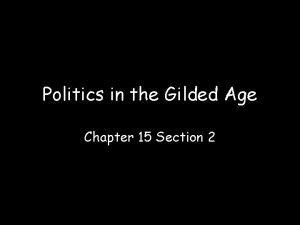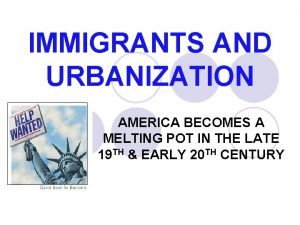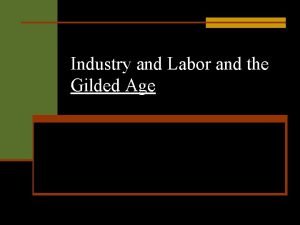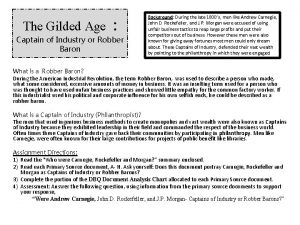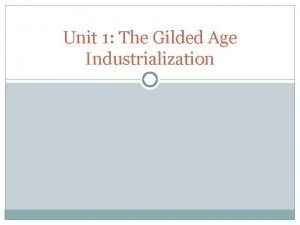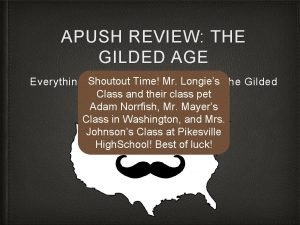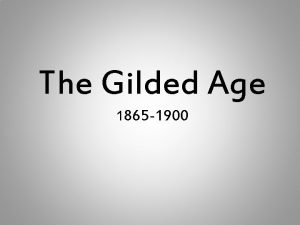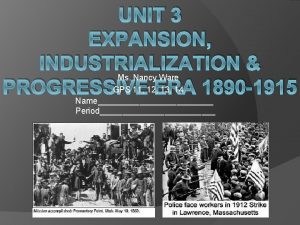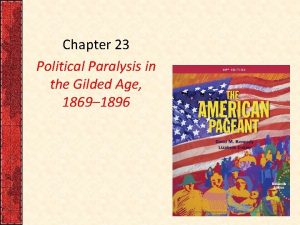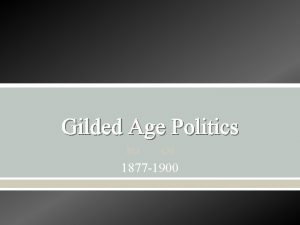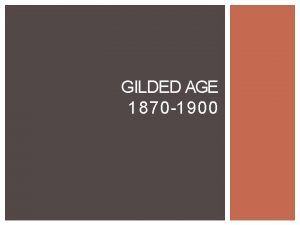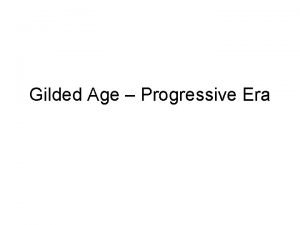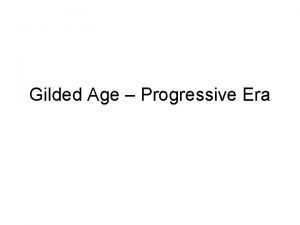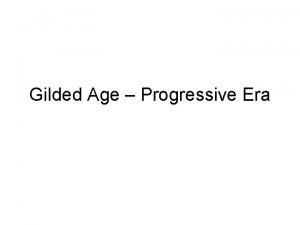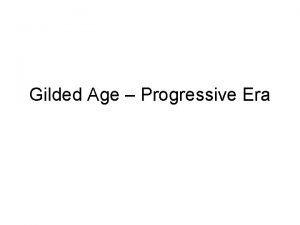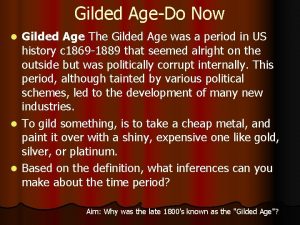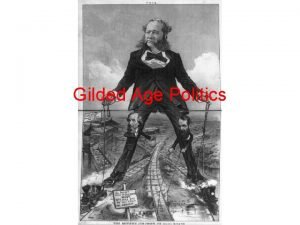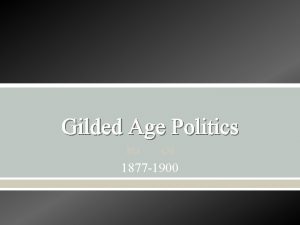Pallid Politics in the Gilded Age Gilded Age
















- Slides: 16

Pallid Politics in the Gilded Age • Gilded Age: – A sarcastic name given to the three-decade-long post-Civil era by Mark Twain in 1873 – Every presidential election was close – The majority party in the House switched 6 times in 7 sessions between 1869 and 1891 – Few significant economic issues separated the major parties yet were ferociously competitive

Pallid Politics in the Gilded Age (cont. ) • Democrats had: – A solid electoral base in the South – In the northern industrial cities—with immigrants and well-oiled political machines • Republicans: – Strength lay largely in the Midwest and the rural and small-town Northeast – Grateful freedmen in the South continued to vote Republican in significant numbers

The Era of Good Stealings (cont. ) • The infamous Tweed Ring of Tammany Hall: – Displayed the “ethics” of the age: – “Boss” Tweed employed bribery, graft, and fraudulent elections to milk New York City of $200 million: • Honest citizens were cowed into silence • Protesters found their tax assessments raised • Tweed’s luck finally ran out: – The New York Times published damning evidence and were offered $5 million not to publish it

The Era of Good Stealings (cont. ) • Gifted cartoonist Thomas Nast pilloried Tweed mercilessly: – New York attorney Samuel J. Tilden headed the prosecution. – Unbailed and unwept, Tweed died behind bars.

p 490





A Carnival of Corruption for President Grant • Misdeeds of the federal government leaders: – Credit Mobilier scandal (1872): • Union Pacific Railroad insiders formed the Credit Mobilier construction company: – Then hired themselves at inflated prices to build railroads line – The company then distributed shares of its valuable stock to key congressmen (BRIBES!)

A Carnival of Corruption for President Grant (cont. ) • Breath of scandal in Washington reeked of alcohol: the Whiskey Ring Scandal – In 1874 -1875 Whiskey producers robbed the Treasury of millions in excise-tax revenue by undercounting the barrels of whiskey they produced – Grant’s own private secretary was among the culprits • Bribes: – Secretary of War William Belknap (1876) forced to resign after pocketing bribes from supplies to the Indian reservations. His resignation accepted “with great regret. ”

Pallid Politics in the Gilded Age – Patronage—lifeblood of both parties • Jobs for votes, kickbacks, party service • Boisterous infighting over patronage beset the Republican party in the 1870 s and 1880 s – Person to know: Roscoe (“Lord Roscoe”) Conkling—A Stalwart who embraced the time-honored system of civilservice jobs for votes

Pallid Politics in the Gilded Age (cont. ) – Half-Breeds wanted some civil-service reform: • Their champion was James G. Blaine of Maine • Conkling and Blaine succeeded only in stale-mating each other and deadlocking their party.

Garfield and Arthur • Presidential campaign of 1880: – James A. Garfield was from the electorally powerful state of Ohio, and supported civil service reform – His vice-presidential running mate was a notorious Stalwart henchman, Chester A. Arthur of New York – Within a year of winning the election: • A disappointed and mentally deranged office seeker, Charles J. Guiteau, shot President Garfield in the back in a Washington railroad station.

Chester and Arthur (cont. ) – Guiteau was found guilty of murder and hanged. • Garfield’s death had one positive outcome: – It shocked politicians into reforming the shameful spoils system. – The unlikely instrument of reform was Chester Arthur. – The Pendleton Act (1883): • The so-called Magna Carta of civil-service reform • It established the Civil Service Commission to make appointments to federal jobs on the basis of competitive examinations (merit) rather than “pull. ”

Chester and Arthur (cont. ) • At first covering 10% of federal jobs, civil-service did rein in most blatant abuses • It made compulsory campaign contributions from federal employees illegal • The “plum” federal posts now beyond their reach, – Politicians were forced to look elsewhere for money, “the mother’s milk of politics. ” – They increasingly turned to the money of big corporations.
 Era of good stealings apush
Era of good stealings apush Chapter 15 section 3 politics in the gilded age
Chapter 15 section 3 politics in the gilded age Pendleton civil service act
Pendleton civil service act The tournament of today
The tournament of today Stone age, bronze age iron age timeline
Stone age, bronze age iron age timeline Iron age bronze age stone age timeline
Iron age bronze age stone age timeline Melting pot gilded age
Melting pot gilded age Gilded age
Gilded age Jp morgan robber baron or captain of industry
Jp morgan robber baron or captain of industry Standard oil monopoly
Standard oil monopoly Taylorism apush
Taylorism apush Ma ma where's my pa apush
Ma ma where's my pa apush What does gilded age mean
What does gilded age mean The great railroad strike of 1877 was provoked by
The great railroad strike of 1877 was provoked by Promontory point gilded age definition
Promontory point gilded age definition Chapter 23 political paralysis in the gilded age
Chapter 23 political paralysis in the gilded age Guilded age presidents
Guilded age presidents


